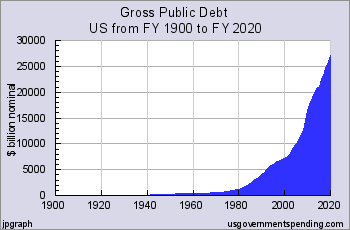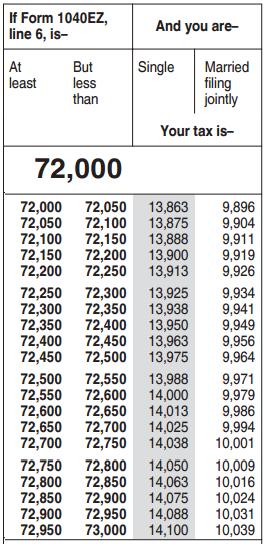Calculus Path
Statistics Path
MTH070
Elementary Algebra
Pre-PreCalculus, part 1
vs.
MTH062
Quantitative Literacy 1
Math for "Real" Life
Sample Course
Which class is right for you?
Is calculus in your future or NOT?
Systems Equations
Solve for `x` and `y`:
`-x+3y=-4`
`-3x-4y=27`
Choose a variable to eliminate. Eliminate `x` first. Multiply equation 1 by `-3`:
`-3*(-x+3y=-4)`
`-3x-4y=27`
Distribute:
`3x-9y=12`
`-3x-4y=27`
Add the equations together:
`-13y=39`
Solve for `y`:
`y=39/-13=-3`
Substitute into one of the equations and solve for `x`:
`-x+3(-3)=-4`
`-x-9=-4`
`-x-9+9=-4+9`
`-x=5`
`x=-5`
We think the solution is `(-5,-3)`.
CHECK:
Plug both values into the other equation to check:
`-3(-5)-4(-3)=15+12=27`
It checks!!!
§ 1-2 Eighteen Trillion and Counting
Problem situation: How Big Is a Billion or a Trillion?

So, where on the number line is 1 billion? Make a mark for 1 billion on the number line.
In news about politics and government, BIG numbers are talked about often. Below is a chart showing the national deficit over time.

On a scale from 0 to 1 trillion, 1 billion is very close to zero, since 1 trillion is 1000 billion!
Imagine a stack of 1,000 one‐dollar bills, which is about 4.3 inches tall.
Complete the table below:
| $ Amount | Height (inches) | Height (feet) | Height (miles) |
|---|---|---|---|
| $1,000 | 4.3 | ||
| $1 million | 4,300 | 358 | |
| $1 billion | 4,300,000 | 358,333 | 68 |
| $1 trillion | 4,300,000,000 | 358,333,333 | 68,866 |
This means that a stack of $1 bills, 3.5 trillion high, would reach the moon.
Polynomial Division
`(x^3-3x^2+4x-5)/(x-2)`
Use long division to find the quotient and remainder:
`x-2 \ bar(")"\ x^3-3x^2+4x-5)`
What do you multiply by `x` to get `x^3`?
Guess: `x^2` and multiply:
| `x^2` | ||||
| `x-2` | `)x^3` | `-3x^2` | `+4x` | `-5` |
| `x^3` | `-2x^2` |
Now subtract:
| `x^2` | |||||
| `x-2` | `)` | `x^3` | `-3x^2` | `+4x` | `-5` |
| `-(x^3` | `-2x^2)` | ||||
| `-1x^2` | `+4x` |
What would you multiply by `x` to get `-1x^2`?
Guess: `-1x` and multiply.
| `x^2` | `-1x` | ||||
| `x-2` | `)` | `x^3` | `-3x^2` | `+4x` | `-5` |
| `-(x^3` | `-2x^2)` | ||||
| `-1x^2` | `+4x` | ||||
| `-1x^2` | `+2x` |
Now subtract:
| `x^2` | `-1x` | ||||
| `x-2` | `)` | `x^3` | `-3x^2` | `+4x` | `-5` |
| `-(x^3` | `-2x^2)` | ||||
| `-1x^2` | `+4x` | ||||
| `-(` | `-1x^2` | `+2x)` | |||
| `2x` | `-5` |
What would you multiply by `x` to get `2x`?
Guess: `2` and multiply.
| `x^2` | `-1x` | `+2` | |||
| `x-2` | `)` | `x^3` | `-3x^2` | `+4x` | `-5` |
| `-(x^3` | `-2x^2)` | ||||
| `-1x^2` | `+4x` | ||||
| `-(` | `-1x^2` | `+2x)` | |||
| `2x` | `-5` | ||||
| `2x` | `-4` |
Now subtract.
| `x^2` | `-1x` | `+2` | |||
| `x-2` | `)` | `x^3` | `-3x^2` | `+4x` | `-5` |
| `-(x^3` | `-2x^2)` | ||||
| `-1x^2` | `+4x` | ||||
| `-(` | `-1x^2` | `+2x)` | |||
| `2x` | `-5` | ||||
| `-(` | `2x` | `-4)` | |||
| `-1` |
Solution: `(x^3-3x^2+4x-5)/(x-2)``=``x^2-x+2+(-1)/(x-2)`
CHECK:
`(x-2)(x^2-x+2)-1=``x^3-3x^2+4x-5` check.
§ 2-1 A Taxing Set of Problems
Problem Situation: Calculate income tax for tax bracket
| If Taxable Income Is: | The Tax Is: |
|---|---|
| Not over $18,150 | 10% of the taxable income |
| Over $18,150 but not over $73,800 | $1,815 plus 15% of the excess over $18,150 |
| Over $73,800 but not over 148,850 | $10,162.50 plus 25% of the excess over $73,800 |

Suppose a couple, married with no kids, filing jointly, earned $93,000 with no other interest or income.
Based on the standard standard married filing jointly deduction, their taxable income is `$93,000-$20,300=$72,700`
According to the tax table above their income tax is
`$1,815+0.15*($72,700-$18,150)=``$9,997.50`
Compare this to line 15 of the table below:

Disclaimer:
You should check with your advisor before taking a math class leading to calculus. Algebra classes are known to cause stress, anger, depression, and occasionally rashes, as well as lead to calculus. Please consult a physician if negative symptoms persist.
